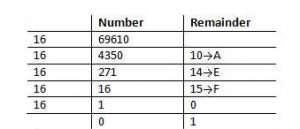Unit 2 – Binary System (Exercise Questions)
2.2. Answer the following questions.
Q.1. Convert (69610)10 to hexadecimal.
Q.2. Differentiate between volatile and non-volatile memory.
Q.3. Store the word “Phone” in computer memory starting from address 7003 where each letter needs one byte to store in the memory.
Q.4. Differentiate between temporary and permanent storage.
2.4. Perform the following conversions.
Q.1. (ABCD)16 to binary.
Q.2. (0010110010001101001)2 to hexadecimal.
Q.1. Convert (69610)10 to hexadecimal.
Answer:
Example 4: 6961010 to Hexadecimal

Ans: 6961010 = 10FEA16
Q.2. Differentiate between volatile and non-volatile memory.
Answer:
| Memory | Storage | |||
| 1. | Memory stores data temporary. | 1. | Storage stores data permanently. | |
| 2. | It has high access speed. | 2. | It has low access speed. | |
| 3. | It is more expensive. | 3. | It is less expensive. | |
| 4. | It is generally smaller in size. | 4. | It is generally bigger in size. | |
| 5. | Programs are loaded into memory | 5. | Programs are stored on storage | |
| during execution. | when not executing. | . | ||
| 6. | Its capacity is typically small. | 6. | Its capacity is typically large. | |
| 7. | It is called primary memory. | 7. | It is called secondary memory. | |
Q.3. Store the word “Phone” in computer memory starting from address 7003 where each
letter needs one byte to store in the memory.
Answer:
The word “Phone” requires 5 bytes in memory as it contains five letters. The “Phone” shows the representation in computer memory as follows:
| Letter | P | H | 0 | n | e |
| Binary value | 01010000 | 01101000 | 01101111 | 01101110 | 01100101 |
| Memory address | 3000 | 3001 | 3002 | 3003 | 3004 |
Q.4. Differentiate between temporary and permanent storage.
Answer:
Temporary storage holds the data as long as the power supply is connected to it The contents of temporary memory are lost as the power supply is disconnected. RAM is an example of temporary storage. The permanent storage holds the data even if the power supply is not connected to it. Hard drive is an example of permanent storage.
Q.5. Write the truth table for X and Y where
X = It is sunny
Y = Today is Monday
Answer:
| x | Y | X AND Y |
| False | False | False |
| False | True | False |
| True | False | False |
| True | True | True |
2.4. Perform the following conversions.
Q.1. (ABCD)16 to binary.
Answer:
The binary value of each hexadecimal digit is as follows:
A=1010
B = 1011
C=1100
D= 1101
Combine all binary values to obtain the answer: (ABCD)16 = 10101011110011012
Q.2. (0010110010001101001)2 to hexadecimal.
Answer:
Step 1: Make groups ‘Of four binary digits from right to left. Add extra O’s to the left it required.
0001 0110 0100 0110 1001
Step 2: Convert each group into hexadecimal number.
1 6 4 6 9
So, 00101100100011010012= 1646916